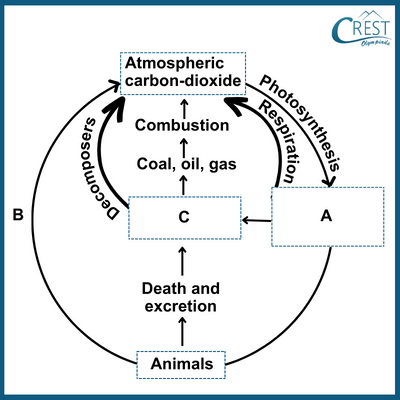1. A region experiences an increase in the frequency and intensity of droughts. How could these changes affect the carbon cycle in the affected area?
a) Increased droughts will lead to reduced photosynthesis rates and decreased carbon dioxide levels.
b) Droughts will cause increased plant respiration, releasing more carbon dioxide into the atmosphere.
c) Decreased water availability will inhibit decomposition, resulting in higher soil carbon content.
d) Droughts will stimulate the growth of nitrogen-fixing bacteria, enhancing carbon uptake by plants.
Answer: b) Increased droughts lead to water stress in plants, causing them to close their stomata and reduce photosynthesis. As a result, plants rely more on stored carbohydrates for energy, leading to increased respiration. This increased respiration releases more carbon dioxide into the atmosphere, affecting the carbon cycle.
2. Based on your understanding of biogeochemical cycles, how does the nitrogen cycle interact with the carbon cycle?
I. Nitrogen fixation provides essential nutrients for plant growth and influences carbon uptake.
II. Denitrification releases carbon dioxide into the atmosphere as a byproduct.
III. Combustion of fossil fuels enhances nitrogen levels in the atmosphere.
a) Only I
b) Both I and II
c) Only III
d) I, II and III
Answer: a) Nitrogen fixation (I) provides essential nutrients for plant growth, influencing carbon uptake. Enhanced nitrogen availability leads to increased plant growth, impacting carbon uptake during photosynthesis. Denitrification (II) releases nitrogen compounds, not carbon dioxide, and combustion of fossil fuels (III) primarily affects carbon emissions, with limited direct impact on nitrogen levels.
3. What is the primary difference between the water cycle and other biogeochemical cycles like the carbon and nitrogen cycles?
a) Water cycle involves only physical processes, while carbon and nitrogen cycles involve both biological and physical processes.
b) Carbon and nitrogen cycles are driven solely by geological processes, while the water cycle involves biological and physical interactions.
c) Water cycle is the only cycle that involves atmospheric components, while carbon and nitrogen cycles are limited to terrestrial processes.
d) Carbon and nitrogen cycles involve the cycling of gases, while the water cycle involves the cycling of minerals.
Answer: a) The primary difference lies in the nature of the processes involved. The water cycle primarily consists of physical processes like evaporation, condensation, and precipitation. In contrast, the carbon and nitrogen cycles involve a combination of biological processes (such as photosynthesis, respiration, and decomposition) and physical processes (like diffusion, dissolving, and sedimentation).
4. Complete the Carbon Cycle shown in the picture by accurately identifying A, B, and C.

a) A: Plants, B: Photosynthesis, C: Organic Matter
b) A: Plants, B: Respiration, C: Inorganic Compounds
c) A: Producers, B: Decomposition, C: Dead Organic Compounds
d) A: Producers, B: Respiration, C: Dead Organic Matter
Answer: d) A: Producers, B: Respiration, C: Dead Organic Matter
5. A city with a high population density experiences air pollution due to vehicle emissions and industrial activities. How might this urban pollution affect the nitrogen cycle in the local ecosystem?
a) Urban pollution enhances nitrogen fixation in soil.
b) Increased nitrogen dioxide (NO2) levels accelerate nitrification.
c) Urban pollution leads to reduced denitrification rates in soil.
d) Nitrogen cycle remains unaffected by urban pollution.
Answer: b) Urban pollution, particularly nitrogen dioxide (NO2) emissions from vehicles and industrial sources, can lead to elevated nitrogen deposition in the local environment. This excess nitrogen can accelerate nitrification, a process in the nitrogen cycle that converts ammonia and ammonium compounds into nitrates. This can disrupt the natural balance of nitrogen compounds in the soil and impact nutrient availability for plants.


